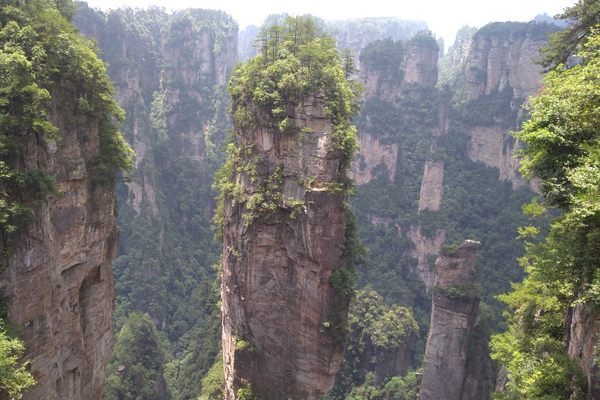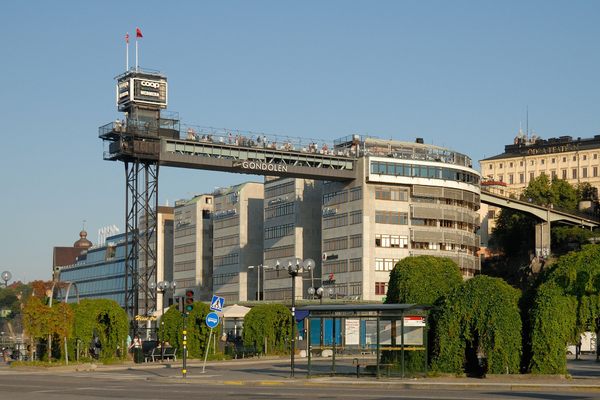Bailong Elevator
The world’s tallest outdoor lift stretches along the stone pillars that inspired the floating mountains in the movie “Avatar.”
The Bailong Elevator in Hunan, China, has had its fair share of controversies. But it’s an undeniably impressive feat of engineering and, at 1,070 feet tall, it holds the record for the world’s tallest outdoor lift.
The Zhangjiajie National Forest Park in the Hunan Province of China is famous for the spectacular sandstone pillars that rise up from the forest floor, the tallest reaching heights of more than 3,000 feet. Think of the floating Hallelujah Mountains in Avatar, and you’ll have a fairly good mental image.
Among these pillars rises another lofty structure, albeit one of steel and glass: the Bailong Elevator (meaning the Hundred Dragons Elevator), officially recognized as the tallest outdoor lift in the world.
Construction began in 1999 and, after an investment of about $20 million, the Bailong Elevator opened to the public in 2002. The elevator was built into a carefully selected quartz sandstone cliff face, into which tunnels and shafts were dug to accommodate the three glass-faced double-deck elevators.
The lift has a total height of 1,070 feet (326 meters), of which the lower 505 feet are embedded inside the mountain wall, with the upper 565 feet consisting of exposed steel derrick. The three elevators run in parallel, offering dizzying views of the sandstone pillars and surrounding mountains and forest.
Following a speed upgrade in 2015, the cars now make the ascent in just one minute and 32 seconds. And, incidentally, it takes 68 minutes and 26 seconds to free-climb the upper exposed section of the elevator, but only if you’re crazy and French.
Each elevator has a carrying capacity of 4,900 kilograms, with 50 passengers traveling in each car. All of which means that the Bailong Elevator is not only the world’s tallest outdoor elevator, but also the world’s tallest double-deck sightseeing elevator and the world’s fastest passenger traffic elevator with the biggest carrying capacity.
Though indeed impressive, the elevator has stirred up a few controversies. It was shut for 10 months during 2002 and 2003 to address safety concerns, which in an earthquake-prone area were especially pressing (the lift cars are all now fitted with earthquake detectors to allow a quick evacuation in case of a quake).
Even more controversial was the idea of building a massive steel elevator in a UNESCO World Heritage Site and protected national park. Apart from all the construction concerns, environmentalists also argued that it would draw even more tourists to an already popular site, putting further pressure on the park and its infrastructure.
The elevator’s supporters have countered this claim with a fairly reasonable argument of their own: the elevator has greatly reduced the damage to mountain trails, as tourists can now bypass them altogether by taking the lift.
Furthermore, they argue, visitors can now come to the park as a day trip thanks to the greatly reduced travel time. Previously, tourists had to drive for more than three hours along what was at times a dangerous mountain road to access different parts of the park. Now, they just have to queue up for a one-and-a-half minute elevator ride. With tourists no longer needing to stay overnight, many hotels and guesthouses have been removed, further reducing the environmental impact of tourism in the park.
Know Before You Go
The Bailong Elevator is located in the Zhangjiajie National Forest Park in Zhangjiajie in the Hunan Province of China. The park is one of several inside the Wulingyuan Scenic Area. Buses from the main bus station in Zhangjiajie City take 45 to 60 minutes to reach Wulingyuan; there are also shuttle buses from the airport. Once inside the park there are four bus routes, two of which stop at the elevator. Elevator tickets cost CNY 72 (about $10.50 US) each way.






















Follow us on Twitter to get the latest on the world's hidden wonders.
Like us on Facebook to get the latest on the world's hidden wonders.
Follow us on Twitter Like us on Facebook